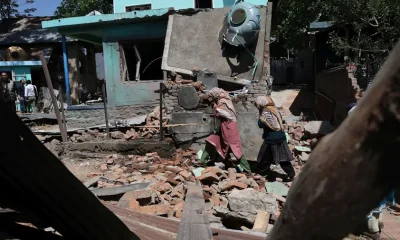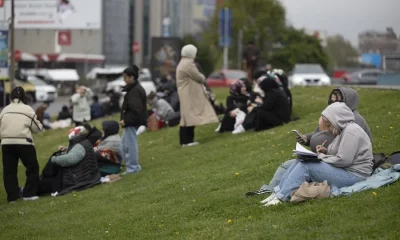Central America
US, EU, Spain give money to address C.American migrant crisis

AFP/Editor
The United States, European Union and Spain on Thursday pledged more than $85 million in aid to Mexico and Central America to offer alternatives to would-be migrants seeking a better life.
Washington has pledged $57 million on top of $310 million in humanitarian aid for the region already announced in April by Vice President Kamala Harris, a government official said in Costa Rica ahead of a presidential summit.
“This money will be used to support efforts in building asylum systems, enabling governments to address the pressures of the migration itself,” Amy Pope, the White House senior advisor on migration, told a gathering in San Jose.
“This is part of president Biden’s much comprehensive approach to migration, is not all about the United States border, it is about what is happening that causes people to feel that they do not have any other choice than to flee,” she said.
Pope spoke at an event in solidarity with forcibly displaced people preceding a summit of heads of state and government of countries in the Central American Integration System (SICA), and Spain.
Spanish Prime Minister Pedro Sanchez told the event his government would contribute $7.6 million to the cause, while the EU pledged another $22.5 million.
“We recognize that without a regional solution, we cannot address this problem,” said Pope.
Undocumented migration from Central America to the United States has been on the increase since 2018, and is a major headache for the administration of President Joe Biden.
Detentions of undocumented migrants, many fleeing poverty or violence at home, hit a 15-year-high along the US-Mexico border in April, with nearly 180,000 people intercepted, according to the US authorities.
Biden is allowing unaccompanied minors to stay and be united with relatives living in the United States.
The Republican opposition has accused Biden of creating a “crisis” on the country’s southern border.
Harris, on a visit to Mexico and Guatemala this week, said countries must work together to address the root causes of the problem, but told would-be migrants “Do not come” to the United States.
“The United States will continue to enforce our laws and secure our borders… If you come to our border, you will be turned back,” she said.
Earlier Thursday, Guatemala’s President Alejandro Giammattei said Biden’s administration was tempting migrants through what he called humanitarian messages.
“Because there they said, ‘we are going to encourage family unification.’ And the coyotes (smugglers) took children and adolescents to the US, and the border filled up, not just with people from Guatemala. A ton of people,” Giammattei told Fox News.
Central America
Nicaragua’s Ortega and Murillo Mourn Pope Francis, Acknowledge ‘Difficult’ Relationship

Nicaraguan President Daniel Ortega and Vice President Rosario Murillo, who also serve as co-leaders of the country, expressed their condolences on Monday following the death of Pope Francis, acknowledging that their relationship with the late pontiff had been “difficult” and “troubled.” Nicaragua officially suspended diplomatic ties with the Vatican during his papacy.
“Our relationship, as Nicaraguans who are believers, devoted and faithful to the doctrine of Christ Jesus, was difficult and troubled—unfortunately shaped by adverse and painful circumstances that were not always understood,” Ortega and Murillo wrote in a message of condolence.
“Despite the complexity and hardships, despite the manipulation we all know occurred, despite everything, we kept our hope alive through Christian faith,” they continued. “We understood the distance, and above all, the complicated and strained communication that prevented better relations. We also recognized the confusion caused by strident voices that disrupted any attempt at genuine interaction.”
Pope Francis had previously compared the Ortega regime to communist dictatorships and even to Hitler, a remark that further strained relations between Managua and the Holy See.
Central America
Cardinal Rodríguez to Attend Funeral of Pope Francis: “He Was Very Dear to Me”

Honduran Cardinal Óscar Andrés Rodríguez announced on Monday that he will attend the funeral services of Pope Francis, who passed away at the age of 88 at his residence in Casa Santa Marta due to a stroke.
“We will be there throughout the novena and then, God willing, at the burial,” Rodríguez said in a phone interview with HRN Radio in Tegucigalpa, apparently calling from Spain.
He added that the last time he saw Pope Francis was in October 2024, during and at the end of that year’s synod, and that they remained in contact through email. “Sometimes, the Pope would even call me,” said Rodríguez, who was born on December 29, 1942, and was made a cardinal by Pope John Paul II on February 21, 2001.
Rodríguez expressed deep sorrow over the passing of Pope Francis, saying: “He was a very dear person to me.”
However, he also shared a message of hope, pointing out that the Holy Father passed away during Easter: “This is a sign. He gave his life completely like the Lord Jesus, and though he died, we believe in faith that he has risen, now with Christ in eternal life.”
Rodríguez, who for ten years coordinated the Vatican’s Council of Cardinals, was one of the eight cardinals selected by Pope Francis to help govern the Catholic Church and reform the Roman Curia.
In January 2023, upon turning 80, Rodríguez stepped down as Archbishop of Tegucigalpa, and Pope Francis appointed Spanish priest José Vicente Nácher Tatay as his successor.
Central America
Senator Van Hollen Meets with Deported MS-13 Member in El Salvador; Trump and Bukele React

U.S. Democratic Senator Chris Van Hollen, representing the state of Maryland, held a meeting in El Salvador with deported MS-13 gang member Kilmar Ábrego García, a member of the criminal group classified by the U.S. government as a terrorist organization.
“Kilmar Ábrego García, miraculously resurrected from the ‘extermination camps’ and ‘torture chambers,’ now sipping margaritas with Senator Van Hollen in the tropical paradise of El Salvador!” wrote President Nayib Bukeleon X (formerly Twitter), sharing photos of Van Hollen, Ábrego García, and a lawyer sitting together at a Salvadoran hotel.
The deported gang member is seen wearing a plaid shirt and a flat-brimmed cap, seated at a table with glasses and coffee cups. The senator also shared images of the meeting on his own social media accounts.
Bukele reaffirmed that Ábrego will remain in El Salvador and will not be returned to the United States.
“Now that his health has been confirmed, he has earned the honor of remaining under the custody of El Salvador,” Bukele added.
Former U.S. President Donald Trump criticized the senator’s meeting with Ábrego on Truth Social, calling Van Hollen “a fool” for advocating for Ábrego’s return to the U.S.
-

 International4 days ago
International4 days agoEl Salvador formalizes the proposal for the exchange of Venezuelan deportees, according to Bukele
-

 International5 days ago
International5 days agoWithin Francis’ private wake: respect and prayer for the deceased pope
-

 International4 days ago
International4 days agoFrom the transfer of the coffin to the funeral, three days to say goodbye to Pope Francis
-

 International5 days ago
International5 days agoTrump’s emissary will visit Russia this week for consultations on the arrangement in Ukraine
-

 International5 days ago
International5 days agoCardinal Becciu’s enigma: will he enter the conclave?
-

 International4 days ago
International4 days agoA very heterogeneous and divided conclave will elect the new pope
-

 International5 days ago
International5 days agoThe pope last called the Gaza parish on Saturday and asked about the children
-

 International4 days ago
International4 days agoModi returns to India and shortens his visit to Saudi Arabia after a deadly attack in Kashmir
-

 International5 days ago
International5 days agoA candidate for the Supreme Court denounces an unequal dispute in the judicial election of Mexico
-

 International5 days ago
International5 days agoThe Government of Colombia presents twelve questions that it will propose in a popular consultation to promote its reforms
-

 International2 days ago
International2 days ago“A dignified life” for migrants, the plea in Panama in memory of Pope Francis
-

 International3 days ago
International3 days agoThe Pope’s funeral procession through the center of Rome worries the Italian authorities
-

 International3 days ago
International3 days agoThe Arab League supports Hamas handing over control of Gaza and weapons to the Palestinian Authority
-

 International2 days ago
International2 days agoA Russian general dies in the explosion of a car bomb near Moscow
-

 International4 days ago
International4 days agoThe Peruvian Public Ministry denounces the former attorney general for an alleged corruption case
-

 International4 days ago
International4 days agoMaradona’s house arrest is again a focus of tension in the trial for his death
-

 International4 days ago
International4 days agoA judge orders the Trump Government to restore Voice of America services
-

 International2 days ago
International2 days agoA magnitude 6 earthquake shakes the province of Esmeraldas in Ecuador, bordering Colombia
-

 International5 days ago
International5 days agoRoyal quinoa, the superfood that grows in front of the largest salt flat in the world in Bolivia
-

 International4 days ago
International4 days agoDonald Trump will visit Saudi Arabia, Qatar and the United Arab Emirates in mid-May
-

 International5 days ago
International5 days agoChurch charges ceased or resigned in the papacy of Francis for cases of pedophilia
-

 International3 days ago
International3 days agoMigrants want to stay on Mexico’s southern border because of Sheinbaum’s industrial plan
-

 International4 days ago
International4 days agoThe president of the World Bank underlines his intention to lift his veto on nuclear energy
-

 International3 days ago
International3 days agoA group of the poor and a delegation of migrants will participate in the funeral and burial of the pope on Saturday
-

 International4 days ago
International4 days agoMarco Rubio reorganizes the State Department to eliminate offices and jobs
-

 International2 days ago
International2 days agoPope Francis’ funeral procession will be a six-kilometer journey through the heart of Rome
-

 International2 days ago
International2 days agoPutin and Witkoff address possible direct negotiations between Russia and Ukraine
-

 International3 days ago
International3 days agoThe pope’s doctor reveals his last moments of life and that he wanted to “die at home”
-

 International3 days ago
International3 days agoFrom email to marriage: the day Pope Francis married a Uruguayan couple
-

 International4 days ago
International4 days agoThe Brazilian Supreme Court opens trial against six others accused of leading the coup attempt
-

 International2 days ago
International2 days agoPreparations for Pope Francis’ funeral, in figures
-

 International4 days ago
International4 days agoA judge in the United States stops the deportation to El Salvador of a hundred Venezuelans
-

 International2 days ago
International2 days agoThe protocol for the funeral of Pope Francis, a delicate diplomatic work
-

 International2 days ago
International2 days agoAbout 150,000 people say goodbye to the pope in St. Peter’s Basilica before the funeral
-

 International23 hours ago
International23 hours agoTrump and Zelensky hold “very productive” meeting in Rome during Pope’s funeral
-

 International23 hours ago
International23 hours agoCardinals seek a “unifier” as they prepare for conclave to elect new pope
-

 International2 days ago
International2 days agoSocial networks, protagonists in the farewell to Pope Francis for ‘selfies’ in front of his coffin
-

 International2 days ago
International2 days agoIndia asks to identify Pakistani citizens in the country to ensure their departure before Sunday
-

 International2 days ago
International2 days agoIndia destroys the homes of the alleged attackers in Kashmir with excavators
-

 International2 days ago
International2 days agoA 4.5 magnitude earthquake shakes the coast of the Aegean Sea in Turkey without leaving injuries or damage















